Vegetarian alternatives have long been on the menu for Australians, so why now is plant-based meat on the rise and more common place than ever before? In an exciting time for the meatless meat industry, one that saw 46% growth in grocery sales for the 2020 financial year, meatless meat is fast becoming a part of meal rotation.
International plant-based meat powerhouse Beyond Meat made headlines for launching its famed plant-based meatballs to Australian supermarkets as well as co-creating the McDonalds plant-based patty. V2food in partnership with Hungry Jacks launched the meat-free burger – the Rebel Whopper – at the end of 2019, Nando’s launched The Great Pretender Burger featuring a vegan chicken patty, and many other fast-food outlets have begun offering imitation meats. Many consumers are now taking into consideration how to incorporate plant-based meats into their grocery purchasing and food choices.
Our Select Opinion Leaders poll asked Aussies about their meat consumption, experience with plant-based meats, and their thoughts on the future growth of the product category…
Rethinking the Target Market for Plant-Based Meats
When people hear plant-based meat they often associate this product category as exclusively relevant to people who do not eat meat. While it is true that vegetarians and vegans are most likely to consume more of this product type than others, plant-based meat is perhaps a misconstrued and under-utilised tool for Aussies looking to reduce their meat consumption.
It may be surprising to some, but the majority of Aussies do not eat meat as part of their everyday meals (54%). Our polling found that currently around one in ten Aussies do not eat any meat (10%), and almost another one in ten eat meat rarely (9%). Over a third of Aussies stated that they only eat meat some of the time (36%), with the remainder falling into category of eating meat most of the time (46%). Meat-centric meals were traditionally an everyday obligation in Australia, but perhaps their rotation on the table is shifting to a less frequent occasion.
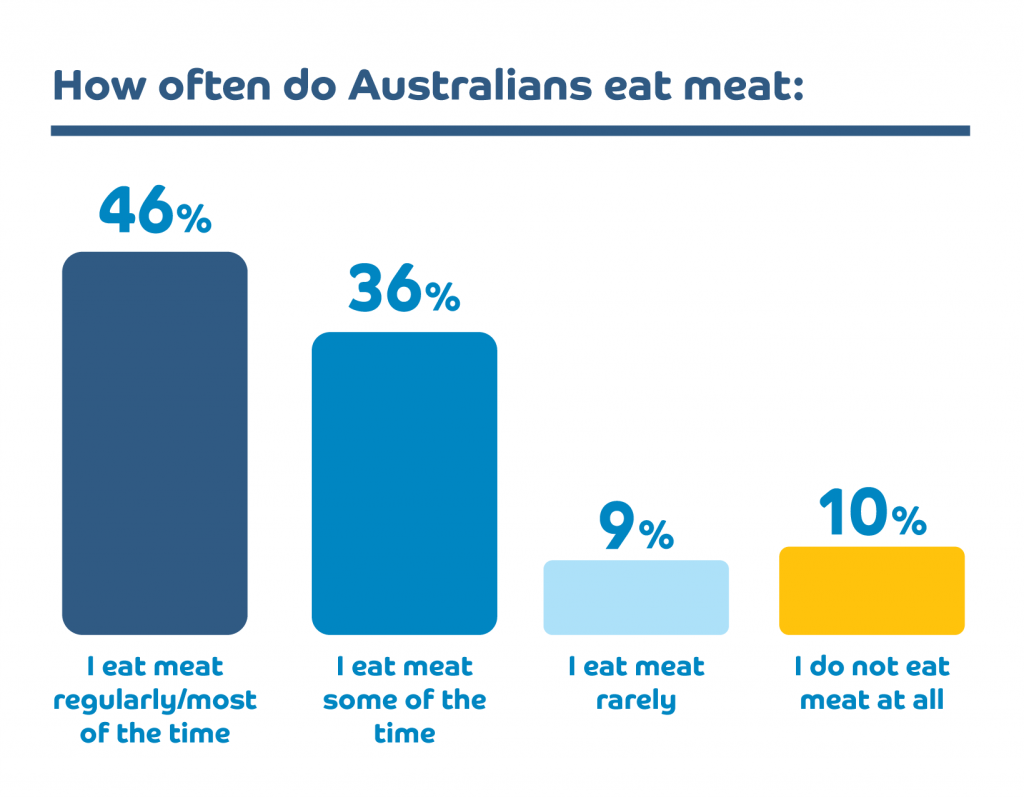
Though the term ‘plant-based meat’ is only recently a commonplace phrase, most Australians are aware that such products exist (93%) and the majority (60%) have tried plant-based meat (inclusive of those who eat meat and those who do not). The most known plant-based meat brand among our participants – Beyond Meat – has been sampled by nearly half of Australia’s vegan and vegetarian population, as well as by more than a quarter of meat-eaters who have tried plant-based meat (26%).
So why are Australians reducing meat consumption? The common motivators often come from one or a combination of three main categories: health, environmental or animal impact. For Aussies who do eat meat but are also consumers of plant-based alternatives, the most reported reason for doing so is in fact to add variety to their diet (20%), followed by it being a good option for reducing the amount of meat they consume for health reasons (17%), or environmental reasons (18%).
Who are the Plant-Based Meat Eaters of Today?
Understanding the various groups of consumers of plant-based meats will be critical to its acceptance and growth. As the biggest fans of plant-based meat products, vegetarian and vegan Aussies will play a key role in supporting the category during its growth, even if they aren’t the target consumer group.
Plant-based meat eaters who rate the meat alternatives highly (7-10/10) were twice as likely (53%) to believe change is an important part of moving forward compared to 25% of individuals who rated plant-based meat poorly (1-4/10).
While most meat-eaters believe they are open to new things (73%), they expressed less likelihood to being open to learning from others (69%), compared to those who do not eat meat (81%). There are also significant differences in the amount of meat Australians are consuming based solely on gender. Only 37% of Australian women consider themselves to be regular consumers of meat, that is to eat meat most of the time. In contrast, 61% of men are eating meat most of the time.
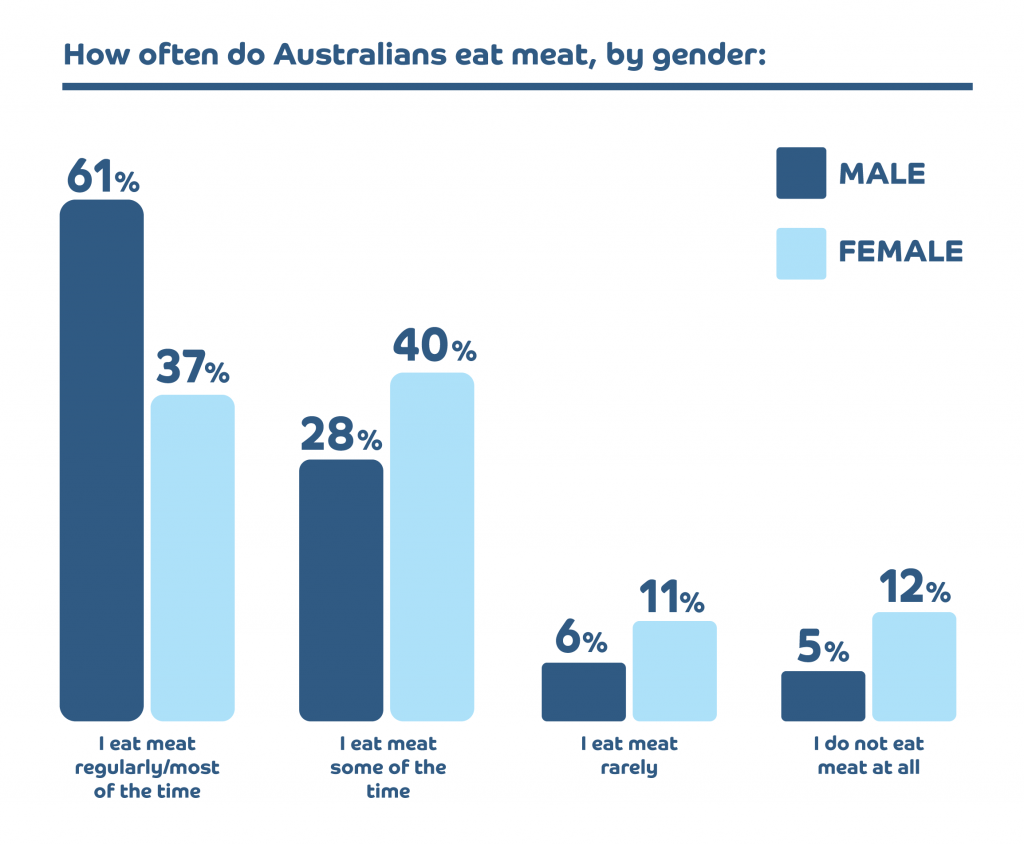
One of the stereotyped stories that society likes to spin about vegetarians and vegans is of a youthful capriciousness – the “it’s a phase” mentality. However, our polling found that of Australian vegetarians and vegans, only 13% were aged under 30, and a significant portion (37%) were aged over 50, with the majority (48%) being 30–49-year old’s.
Interestingly, while eating meat regularly (most of the time) peaks for those aged between 35 – 64 a drop off in the frequency is apparent of meat eating for both younger (those below 35 years old) and older (those aged 65 and over) consumers. Also of interest is that the majority (72%) of non-meat eaters do not have children in the home. Is it because meeting children’s health needs are easier done with exposure to meat or that children are more inclined to eat family favourites with meat bases? Opportunities exist for the plant-based alternative manufacturers to tap into this market and offer family classics to enter family meal rotation.
Meat Eaters Perspective on Plant-Based Meat
Of the Australians who eat meat most of the time, nearly half have already sampled plant-based meat (49%), most commonly products by Beyond Meat and The Alternative Meat Co. Unfortunately, when asked to rate plant-based meat overall based on their experience, it is apparent this group of consumers are less than impressed.
“I love the idea of plant-based meals, but I find the current offerings in the market to be very expensive and often very bland”
Australians who are regular consumers of meat gave an average rating of just 5 out of 10 for the plant-based meat products they have tried. Seemingly, the evaluation of plant-based meat is directly correlated to the level of consumption of meat, with vegan and vegetarians rating it highest (7.5 out of 10), and this rating decreasing with the amount of meat a person consumes – for those only eating meat rarely, plant-based meat rates a 7.2 out of 10, and for those eating meat some of the time the rating drops to a 6.
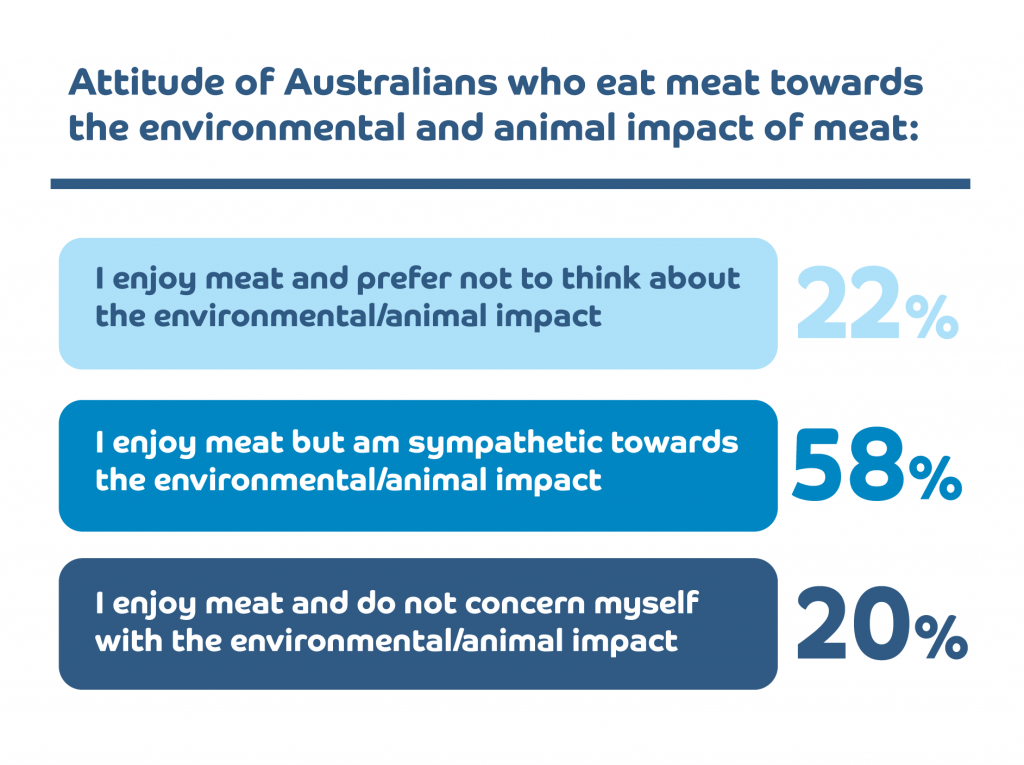
For meat consumers, actual meat offers a superior quality experience, and so the decision to swap out some or all of their meat consumption really comes down to an obligation to either their own health, the health of the planet, or the welfare of animals. Most Aussies who eat meat regularly state that despite this fact they are also sympathetic towards the environmental and animal impact, (58%), while the remaining are either not concerned by these matters (20%) or just prefer not to think about it (22%). Those that are sympathetic might be the next wave of consumers reducing their meat consumption, but what will bring them closer towards that change?
“I don’t have a need or desire to replace meat with plant-based products but if there was a cost saving or taste benefit I would use it regularly”
The top factors that meat consumers dislike about plant-based meat are flavour (79%) and texture (67%) – clear factors to be focused on for improvement by manufacturers. But correcting these aspects cannot be at the cost of other factors.
Of most concern to this group is that the plant-based meat is a healthy option (e.g. low in sodium and saturated fats, etc.), which rated an average of 7.4 out of 10 for importance. Following this was that plant-based meat containing a high level of protein (7.2 out of 10) and that the plant-based meat is versatile enough to replace meat when cooking (6.9 out of 10).
Converting Consumers to Try and Buy Plant Based-Meats
Consumers who have not tried plant-based meat are a diverse collection – comprising both vegan/vegetarians (who can be opposed to the products for being too meat-like), meat eaters (who can be opposed to the product for being not meat-like enough) and everyone in between.
When asked what they would do if presented with a free taste-test of plant-based meat at their local shop, (pre-COVID times), the regular meat-eaters who had not tasted plant-based meats reported a higher rate of hypothetical uptake (65%) than those who do not eat meat at all (50%). In fact, the majority of vegetarians and vegans who have not tried plant-based meats said that nothing would make it more appealing to them (71%), compared to only 53% of meat-eaters. Making the meat-eater a more likely prospective conversion for plant-based meat companies.
“I prefer to eat fresh plants and don’t like the smell or taste of meat, but can see why a meat eater may prefer to eat plant-based meats as a healthier and more environmentally sensitive alternative”
For meat-eaters the top suggestion to enhance the appeal was for the taste to be like-for-like to real meat (33%) as well as the texture to be like-for-like to real meat (24%). While, for vegetarians and vegans who have not tried plant-based meats, the top suggestion to make it more appealing was a recommendation from healthcare professionals (29%). Still, this may not be enough for some – “[I am] curious, but can’t bring myself to it”, one participant expressed.
When asked why they had not tried plant-based meat yet, most of these consumers provided the reason as simply that it does not appeal (48%), followed by liking meat too much to bother with plant-based meats (39%). Additionally, around a quarter of this group say that they will not go out of their way to try it (26%), however 21% have not tasted plant-based meat because they simply have not come across it.
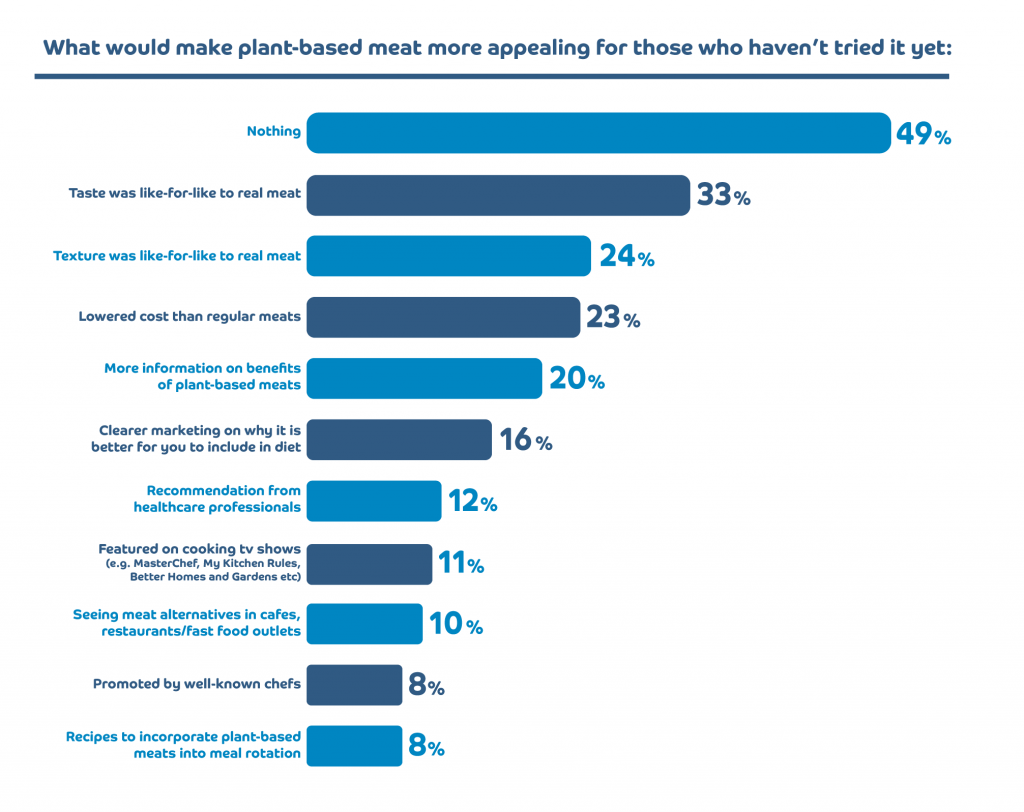
With many regular meat eaters expressing an open-mind to trying plant-based meats and considering it as part of their meal rotation, getting them over the line is another feat altogether. Some concerns expressed included:
“Would it even taste like real meat”
“They need to be better tasting”
“If they were more widely available, I’d be happy to change my diet”
“I am concerned they have chemicals and high amounts of fats to generate a similar taste to real meat”
“It’s got to be artificial and that can’t be good for you”
“Too genetic, too scientific, too modified… chemical based”
“They may taste nice, but they are overly processed”
“It’s difficult to tell from the ingredient lists what it is actually made of…”
“Another altered product, over manufactured and things added”
“Not enough protein per gram”
“Too processed, don’t know what is in it”
Taking these real concerns around product ingredient lists, labelling and communications about processing might mean the difference between an on the fence meat-eater adding a plant-based alternative to their regular diet.
The Future Of Plant-Based Meats…
“My opinion of plant-based foods are that I am not sure what the health benefits are. Once known, might try a meal”
As consumers become more aware of the positive impacts that using plant-based meat can have, they are likely to become more interested in giving it a go. When showed some examples of health benefits that are associated with plant-based meats, 56% of Australians said that based on that alone they would be willing to try plant-based meat or eat more if they are already a consumer. Likewise, the same percentage of people found that knowing the environmental benefits of plant-based meat would have the same result on their purchasing of it.
Regardless of declaring it ‘unappealing’ or ‘pointless when they have the option of meat’, those who are yet to sample this meal option are still very much open to trial if a family member or friend cooked it for them (67%). And perhaps that’s where continued growth in the industry will lie – more people talking about plant-based options and introducing it to others.
Speaking of fostering positive word of mouth, vegan and vegetarian consumers are currently the best advocates for the product category, with 9 out of 10 who have tried plant-based meat recommending it within their social circles. Even the meat-eaters are providing positive word of mouth, with just over half who have tried plant-based meat suggesting it to family and friends (52%).
“They are not perfect, but if more people are willing to use these products, I am sure they will get tastier and tastier as time goes by”
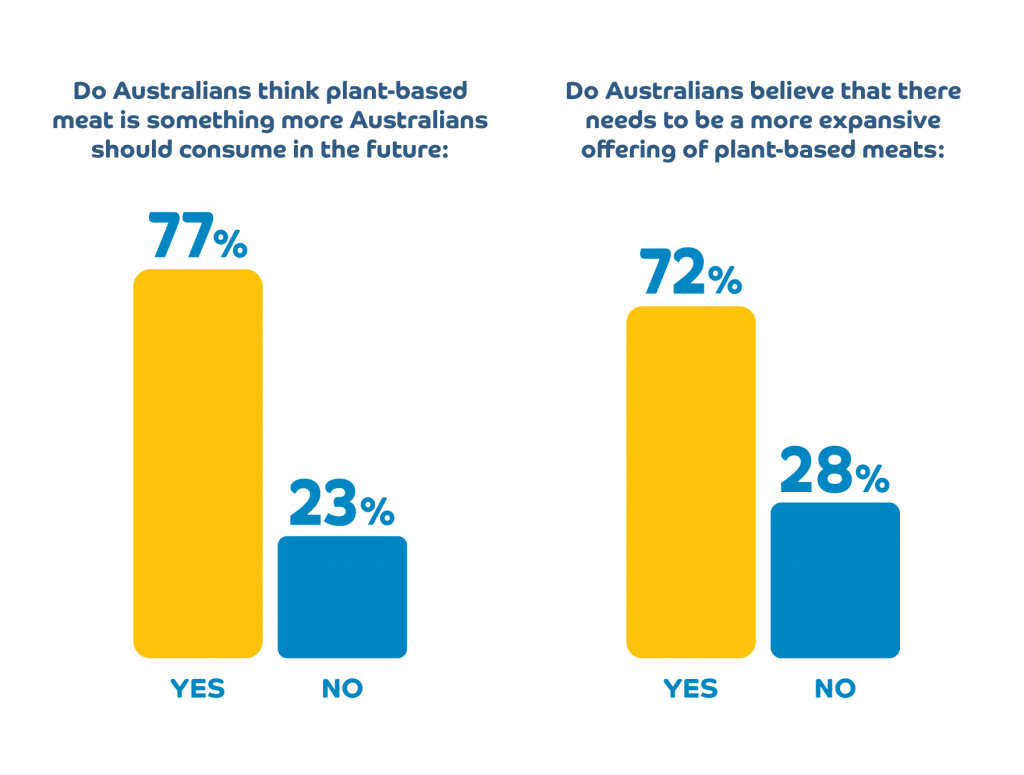
Most Australian consumers feel that the plant-based meat offering needs to expand even more than it has in the last twelve months (72%), whilst also believing that plant-based meat is something more Australians should consume in the future (77%).
This coupled sentiment will also play a great role in continued growth for the industry, thus allowing further advancements in the offering – better taste, texture, ingredients and versatility. Providing support and patience to the industry and it’s mistakes are going to benefit everyone in the long-run, because as one participant expressed as a summary of their perception of plant-based meats – ”They have an important role to play in feeding the human population – now and in the future”.
Ekas spoke to 822 members on it’s panel Select Opinion Leaders in June 2021.
